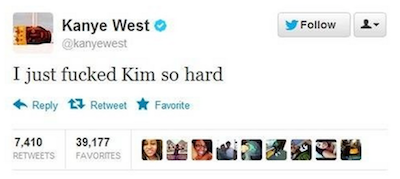Normally Combat! blog does not concern itself with celebrities, for the simple reason that we are much more interested in ourselves. It is a widespread problem. Anyone who has taught Intro to Creative Writing knows the power of the autobiographical story to fascinate exactly one person. What happens to us is wildly compelling; even if the plot isn’t great, the setting at the center of the universe makes it terrific. What happens to others is boring. It seems like a perfect system, but there’s a flaw. Kanye West found it a couple weeks ago, when he tweeted and quickly deleted the following:
Then Kim was like, “oh, someone mentioned me on Twitter.”
One might hope that a millionaire genius of Kanye’s caliber would be above doing such a thing, but it is also understandable. He’s just finished having mind-blowing sex on his disposable mink bed; he’s not thinking clearly, and he rolls over and wipes his hand and reaches for his phone. Anyone could do it. Therein lies the problem.
Much like sex, a social media transmission requires a sender and a receiver. Also like sex, both parties regard themselves as the sender, even when they also are receiving. I am on Twitter, but it is not so I can hear about the workout/Starbucks routines of Phil Baroni. It’s so I can lure more wayward souls to the words of Sir Nigel Longstock—and all those people are on Twitter to try to get people to listen to them. The same thing can be said of pretty much any cocktail party.
It’s the problem of others: our positions are analogous and, theoretically, the same, but our interest is wildly asymmetrical. Two people talking to each other are equals. One person talking to me is my audience. This failure of perspective is how Kanye winds up alerting everyone, including Kim, that he just [loved] Kim so hard. It’s how one billion of us signed up for Facebook primarily to complain about it.
In olden times (10,000 BC–1996,) the discrepancy between self and others was less massive. The 36 other people in your village were bored by your description of how your daughter got taken by plague, but you listened to the barber talk about the homunculus in his churn for two hours, so it all balances out. Each person tolerated a reasonable number of others who indulged in the same narcissistic blathering as himself. Those people were irritating, sure, but they were a reasonable price to pay for having someone to talk to.
Now, however, the number of others has drastically increased. It’s increased concretely, in that there are seven billion people on earth, and it has increased abstractly, in that the internet brings us those people’s blatherings with unprecedented efficiency and speed. Where once the ratio of self to others was exactly 1 to 42, now it’s something like 1 to 11,433. I’m approximating, here, but my point is that the number of others keeps going up, while the number of selves stays the same.
Yes, this new multiplication of others through social media and them [loving] one another so hard provides a larger audience for our own reports of self. And yes, it unfortunately makes it more likely that any given other will inflict his own report on our own personal self. But it also has another, more sinister effect: it cheapens our self’s value as an audience member.
When I am one of a dozen, my friends must take care to include in their speaking some element of at least tangential relevance to me. When I am one of ten thousand, I can go to hell. Lord knows those other people can. As the number of others increases, they don’t just become more irritating to us; we become less valuable to them.
Imagine the problem for Kanye, whose life is unusually defined by this relationship between self and others. He’s got way more social media contacts and other species of fake friend than you or I, and his relationship with them is considerably more one-directional. Probably, it warps his mind. His eight million Twitter followers vastly outnumber any people he might know in real life, and yet he speaks to them all the same way. He unclenches his toes, maybe yawns, and reports that he has just [loved] Kim so hard. Then he remembers that Kim is right next to him and, to his surprise, she has in fact just finished [loving] him.






Get out of my brain.
Also, I think there’s still a bit of social media juvenility. Not enough people prone to impulsively blathering about themselves have read about how stupid or selfish it makes them seem. As time goes on, social propriety will compel these people to post fewer and fewer things without consideration of their audience. Just as today, if you take even a single shit on the floor, everyone in the room will chastise you, in the future, there will be more obvious prohibitions about being transparently narcissistic.
This post is one strand of such awareness.
And, simultaneously, Kim recorded her coital thought, “Tan. I’ll paint the ceiling tan.”
The creepy thing is that when someone says “1996,” I instantly think of “No Diggity” and the appropriation of the Lil’ Penny doll in the music video.
Play on, Dan Brooks, play on.
“What happens to us is wildly compelling; even if the plot isn’t great, the setting at the center of the universe makes it terrific.”
This should be the epigram to every intro to Creative Writing textbook.
Agreed, pj. That line made my day.